dimanche, 14 août 2022
Julius Evola et l'idéalisme, entre Benedetto Croce et Giovanni Gentile
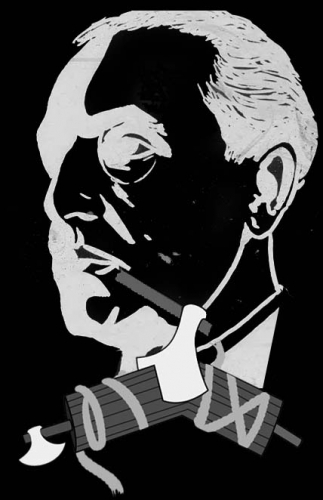
Julius Evola et l'idéalisme, entre Benedetto Croce et Giovanni Gentile
Luca Valentini
Source: https://www.paginefilosofali.it/julius-evola-e-lidealismo-tra-benedetto-croce-e-giovanni-gentile-luca-valentini/
"...la question de savoir si l'homme peut ou non donner une certitude et un sens à sa vie et à son expérience - ne peut être démontrée théoriquement : elle peut être décidée non par un acte intellectuel mais par une réalisation concrète -" (1).
La relation entre Julius Evola et l'idéalisme, loin de représenter la phase dite "philosophique" du traditionaliste italien, rend en fait explicite la première conquête ontologique de son propre parcours existentiel et ésotérique. Ce qui ressort des textes sur l'Individu Absolu et surtout des réflexions sur l'Idéalisme Magique présuppose que le thème gnoséologique ou la connaissance ne peut être lié à une détermination abstraite, mais à une phase expérientielle directe, où le hiatus entre connu et connaissable est et peut être dépassé. Par conséquent, l'idéalisme qui peut être sublimé est pour Evola une praxis philosophale plutôt que philosophique, qui détermine une acquisition initiale de nature magico-hermétique : il n'y a pas d'entité cosmique qui se différencie de l'individualité humaine et transitoire, soumise aux influences de ce mode hétéronome, mais un Ego activement transcendant peut et doit être réalisé, qui connaît le monde parce qu'il a commencé à se connaître lui-même, restant, sous une apparence philosophique dans l'idéalisme, une vérité hermétique, l'identification non seulement spirituelle, mais aussi spatiale - temporelle entre Homme - Monde - Dieu, comme trois phases phénoménales du même processus cognitif, que seul l'égarement moderne et chrétien présuppose comme différentes, successives, sinon même opposées. Dans le parcours d'Evola, commence à émerger ce qui, dans l'idéalisme classique (Böhme, Hegel,...), était défini comme l'"Abgrund", ou le centre obscur de la conscience, le point focal où l'ego se contracte et se dilate, se dissout et se coagule hermétiquement, pour déterminer une acquisition initiale d'identité avec Dieu :
"L'activité spéculative du philosophe, qui tente de comprendre la création dans son telos et dans tous ses aspects, représente en effet l'achèvement ou l'accomplissement de l'autoréflexion de l'Infini" (2).
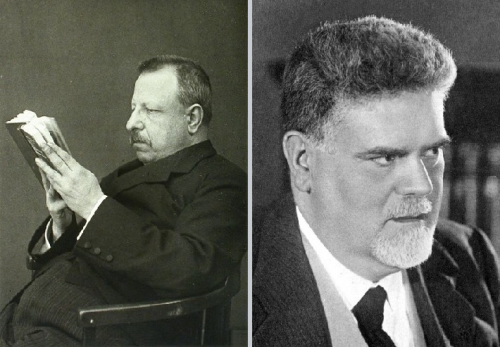
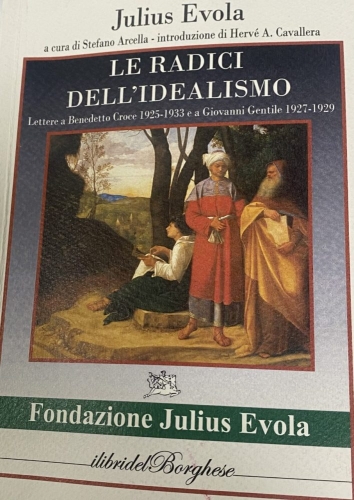
C'est dans ce contexte que se trouve la nouvelle édition des lettres de Julius Evola à Benedetto Croce et Giovanni Gentile - "Julius Evola - Le Radici dell'Idealismo - Fondazione Julius Evola - I Libri del Borghese, Roma 2022" -, écrites entre 1925 et 1933, grâce à l'habile édition de Stefano Arcella, avec une introduction de Hervè A. Cavallera, un appendice d'Alessandro Giuli et une postface de Giovanni Sessa. Concrètement, le mérite qui doit être définitivement attribué à l'éditeur est celui d'avoir reconstitué avec un scrupule documentaire et philologique l'environnement culturel dans lequel sont nées et se sont développées les relations entre le traditionaliste et les deux grands représentants de la culture et de la philosophie du début du 20ème siècle, Croce et Gentile. Il en ressort une image précise et nullement désinvolte d'une rencontre non fortuite entre un Evola en cours de formation, mais pas seulement un philosophe, et deux intellectuels qui, dans la vulgate générale, n'avaient que peu à voir avec le monde de la spiritualité et surtout de l'ésotérisme.
Dans le contexte de l'approbation de Croce aux éditions Laterza pour la publication des ouvrages d'Evola "Théorie de l'individu absolu" et "La tradition hermétique", mais aussi pour la réimpression sous sa direction de l'ouvrage alchimique de Cesare della Riviera "Le monde magique des héros", un intérêt insoupçonné du philosophe italien émerge
"en ce qui concerne les textes ésotériques des XVIe et XVIIe siècles en Italie, l'attention qu'il porte aux études savantes qui émergent dans les années 1920 sur la tradition alchimique-hermétique de la Renaissance, ainsi que les influences philosophiques qui, dans sa propre formation, sont à la base de cette attention à l'ésotérisme italien de la Renaissance et du XVIIe siècle" (3).
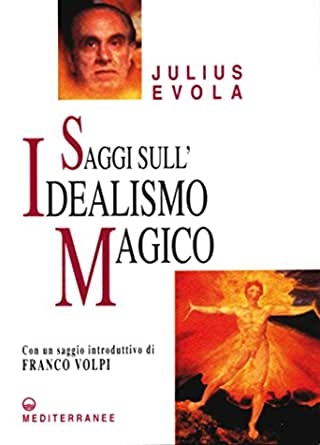
Les fréquentations de Croce non seulement avec des cercles culturels napolitains spécifiques, mais aussi avec Evola lui-même, comme documenté dans le texte, semblent ne pas avoir été accidentelles, comme celle avec Reghini (4), cité méritoirement par Arcella, mais aussi avec un certain Vincenzo Verginelli (appelé 'Vinci' par Gabriele D'Annunzio), un disciple direct de l'hermétiste napolitain Giuliano Kremmerz et un point de référence central, pour le Circolo Virgiliano de Rome, dans la sphère de la Fratellanza Terapeutica di Myriam pendant toute la période d'après-guerre, qui avait une tendre connaissance avec Elena, la propre fille de Croce (5).
Toujours la sphère idéaliste, est le thème de comparaison qui a permis à Evola de se mettre en relation avec l'actualisme de Giovanni Gentile, auquel Stefano Arcella consacre un chapitre spécifique "Il fiore che non sboccia. Un tentativo di confronto fra Weltanschauung tradizionale e idealismo attuali stico" (6). Un attrait archaïque commun est évident dans l'œuvre, celui-là même qui a lié l'idéalisme classique à l'hermétisme par l'intermédiaire de Böhme (7), avant même Hegel, mais une inconciliabilité de fait. Même si la familiarité chez Gentile entre l'esthétique originelle et la modalité magique doit être considérée comme heureuse, comme le souligne Giovanni Sessa dans sa postface (8), même si dans l'acte de Gentile il est possible de reconnaître une première expérience mystique, le logos assume et reste dans son sémanthème "dianotique" décandent, comme une simple activité cognitive discursive. La rencontre - même avec Spirito, comme le précise Alessandro Giuli dans son Appendice - n'a pas lieu, mais une agréable connaissance demeure, car Evola fait le saut que Croce et Gentile ne font pas, celui de la Diánoia, comme raison déductive et réflexive, à la Nóesis, comme intuition intellectuelle exprimant la connaissance directe, fulgurante, non réfléchie, l'identité :
"La science en action est identique à son objet" (9).
Il est cependant nécessaire, pour la sublimation magique de l'idéalisme, telle qu'elle est exprimée et vécue par Evola, de ramener le terme "logos" à son sens premier : non plus discours ou parole exprimée, mais Pensée inexprimée, Noûs, Minerve opérante, sphère de l'intelligible où, hégéliennement et hermétiquement, le Tout exprime le Tout et l'Un, sans opposition.
La philosophie, en conclusion, démontre toujours ce à quoi elle se réfère in nuce, mais qu'elle a irrémédiablement perdu au cours des siècles, à savoir "l'identité entre verum et factum" (10), dans un processus régressif de miroir, puis de spéculation, qui ne permet pas la reconnaissance authentique de la dimension originelle. Une ombre peut être une bonne trace pour repartir sur le chemin de la redécouverte de la lumière authentique, à condition d'être convaincu qu'une ombre est telle et persiste, sans même la confondre avec une lumière éphémère. La relation entre Julius Evola, Benedetto Croce, Giovanni Gentile et le monde de l'idéalisme et de la culture italienne, sert également à sceller cette hypothèse irréductible et à ne pas se limiter à l'étude approfondie d'Evola, s'aventurant même dans ses œuvres majeures, à savoir les œuvres magiques et méditatives. Il n'y a pas que Orientamenti, en somme ... !
Notes :
1 - 1 – J. Evola, Saggi sull’Idealismo Magico, Casa Editrice Atanor, Todi – Roma, 1925, p. 14;
2 - G. A. Magee, Hegel e la tradizione ermetica, Edizioni Mediterranee, Rome, 2013, p. 113. Dans la postface du texte, rédigée par Giandomenico Casalino, et non par hasard, dans l'examen des relations entre le platonisme, l'hermétisme et la philosophie hégélienne, l'intuition évolienne est reproposée : "C'est la connaissance fondée sur la concordance nécessaire, purement platonicienne, entre les lois de la pensée et celles de la réalité..." (p. 295) ;
3 - Le Radici dell’Idealismo, référence dans le texte, p. 24 :
4 - Ibid, p. 55 ;
5 - Ibid. Vous trouverez de nombreuses informations à ce sujet dans le texte édité par Enzo Tota et Vito Di Chio, Vinci Verginelli, SECOP Edizioni, Corato (BA), 2016 ;
6 - Le Radici dell'idealismo, op. cit. p. 99 et suivantes ;
7 - Emile Boutroux, Jakob Boehme o l’origine dell’Idealismo tedesco, Luni Editrice, Milan, 2006, p. 70 : "L'homme possède ainsi toutes les conditions de la liberté, et peut, à volonté, s'enfoncer en lui-même ou se trouver réellement, en renonçant à lui-même", dans lequel le renoncement est supposé être la déconstruction du Moi, pour une pleine affirmation du Moi ;
8 - Le Radici dell'idealismo, op. cit. p. 174 et suivantes ;
9 - Aristote, De anima, III, 431 a, 1 ;
10 - Le Radici dell'idealismo, op. cit. p. 44.
21:50 Publié dans Philosophie, Traditions | Lien permanent | Commentaires (0) | Tags : idéalisme, philosophie, italie, julius evola, giovanni gentile, benedetto croce, tradition, traditionalisme |  |
|  del.icio.us |
del.icio.us |  |
|  Digg |
Digg | ![]() Facebook
Facebook
vendredi, 27 mars 2020
Evola and Italian Philosophy, 1925–49: Three Biographical and Bibliographical Essays
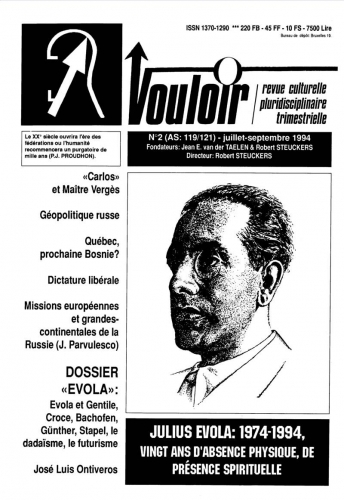
Evola and Italian Philosophy, 1925–49: Three Biographical and Bibliographical Essays
by Gianfranco de Turris, Stefano Arcella & Alessandro Barbera
Translation by Fergus Cullen
The following essays all appeared in Vouloir 119–121 (1996), the supplement to the revue Orientations, edited by Robert Steuckers. They centre on Julius Evola’s relations with the two major figures of Italian philosophy in the interwar period.
In “Evola, ultime tabou?” (pp. 1–3), Gianfranco de Turris asks if the rehabilitation enjoyed by such philosophers as Giovanni Gentile, previously denounced as Fascist, might be afforded to Evola. He briefly sketches the case in his favour: unlike the marginal crank of post-War imagination, Evola seems to have maintained relations with such figures of the first rank as Gentile and Benedetto Croce. In “Gentile/Evola: une liaison ami/ennemi…” (pp. 3–5) Stefano Arcella examines Evola’s fertile collaboration with Gentile and Ugo Spirito on the Enciclopedia Italiana. And in “Quand Benedetto Croce ‘sponsorisait’ Evola” (pp. 5–7) Alessandro Barbera investigates the Croce connection, looking in some detail at the correspondence between Evola, Croce, and the publisher Laterza.
French originals:
1—http://www.archiveseroe.eu/evola-a48672110
2—http://www.archiveseroe.eu/gentile-a126198308
3—http://www.archiveseroe.eu/croce-a126196870
PDF of this translation:
https://www.academia.edu/42191919/Evola_and_Italian_Philo...
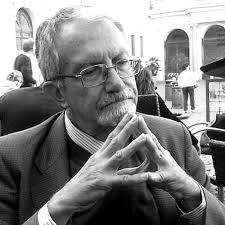
Gianfranco de Turris
Evola: the Last taboo?
by Gianfranco de Turris
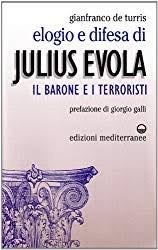 We will surely remember 1994 better than 1984, which Orwell immortalised by writing his celebrated apocalyptic book predicting an ultra-totalitarian world in which we all would have been irredeemably crushed. We will not remember it solely for the political event of 27 March in Italy, but above all for the consequences that this “reversal” might (I insist on the conditional!) have in the cultural sphere. Whatever one may thing of the victory of Berlusconi and his allies, it has already had a first result: the organisation of a colloquium dedicated to the personality of Giovanni Gentile; it was held in Rome on 20 and 21 May 1994 on the initiative of the leftist municipal council (which does honour to the Italian left, as does the other colloquium it dedicated to Nietzsche). We remember he whom we always defined as the “philosopher of Fascism,” fifty years after his death, when he was assassinated by a commando of communist partisans in Florence on 15 April 1944. After having beaten a long and sinuous intellectual course, many post-Marxist philosophers, such as Colletti, Marramao and Cacciari, claimed him for an authentic figure of the left, at least in a decent part of his work.
We will surely remember 1994 better than 1984, which Orwell immortalised by writing his celebrated apocalyptic book predicting an ultra-totalitarian world in which we all would have been irredeemably crushed. We will not remember it solely for the political event of 27 March in Italy, but above all for the consequences that this “reversal” might (I insist on the conditional!) have in the cultural sphere. Whatever one may thing of the victory of Berlusconi and his allies, it has already had a first result: the organisation of a colloquium dedicated to the personality of Giovanni Gentile; it was held in Rome on 20 and 21 May 1994 on the initiative of the leftist municipal council (which does honour to the Italian left, as does the other colloquium it dedicated to Nietzsche). We remember he whom we always defined as the “philosopher of Fascism,” fifty years after his death, when he was assassinated by a commando of communist partisans in Florence on 15 April 1944. After having beaten a long and sinuous intellectual course, many post-Marxist philosophers, such as Colletti, Marramao and Cacciari, claimed him for an authentic figure of the left, at least in a decent part of his work.
So Gentile recovers all his dignity for the “official” culture in Italy: of course, this concerns first of all Gentile the philosopher, and not the man and political militant. All the same, his rehabilitation as a philosopher marks a step forward in the liberation of spirits. So the last taboo for Italian intellectuals remains Julius Evola, as Pierluigi Battista nicely put it in the columns of Tuttolibri. Now, this year we also commemorate the twentieth anniversary of Evola’s death (11 June 1974). For Gentile, Italian official culture has at last come to accept, after a half-century and only some years before the year 2000, the position and importance of the “actualist” and Fascist philosopher. For Evola, on the contrary, a silence is always held, even is, imperceptibly, one feels that something is in the process of changing.
Luciferian Dilettante
Evola, in official culture, is thrown from one extreme to the other: on the one hand, he’s a demon, the Devil, an almost Luciferian personage, an ultra-racist to whom salvation is never to be granted; on the other, he’s culture’s sock-puppet, the inexact dilettante, unscientific and superficial, a clown of esotericism, “il Divino Otelma.” In interesting ourselves in him, we then risk toppling into the laughable, unless a more authorised voice begins to speak of him.
So there is still much work to be done on Evola, whether it be as a thinker of multiple interests, as an organiser of colloquia and promoter of intellectual initiatives between the Wars, as a man of culture and innumerable contacts, who received many suggestions from his contemporaries and gave in his turn.
During the twenty years that have passed since his death, few things have been done on his work and person in Italy; and these were the work of a small number of those who had always referred to Evola. We’ve found neither the time nor the manpower. It’s a bitter truth; but it’s so. It suffices to consider archival research: to reconstitute the facts and ideas, to fill in the “voids” in the life and in the evolution of Evolian thought, we need the documents; and these are still not all archived. The documents exist: it suffices to go and search where one thinks they might be found…
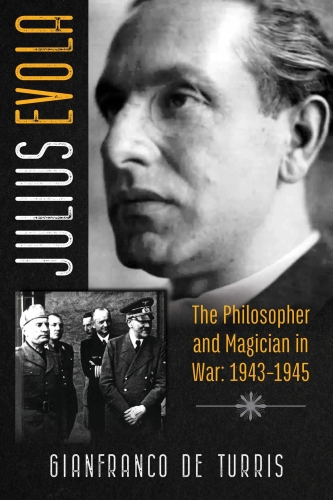
For example, we don’t have access to the complete documentation on the relations between Evola and the Italian philosophical world of the ’20s and ’30s: Croce, Gentile, Spirito, Tilgher… We only finally know what Evola recounts of himself in his “spiritual autobiography,” The Path of Cinnabar. Ultimately, we know what we can deduce of his positions on diverse philosophical systems and on what we surmise intuitively. In general, we only know the views and opinions on Evola of the historians and academics who have especially studied that period of Italian culture: and they say that Evola was an isolated, marginal figure; that his ideas were not taken into consideration; that he was a singular, if not folkloric, figure. But do these opinions really correspond to reality?
We believe that we can today affirm that things were not so simple: that Evola was more relevant in his epoch than we’ve believed him to be. And we affirm this on the basis of a series of indications, hidden until today. The Roman weekly L’Italia settimanale is cataloguing these indications for the first time in a special supplement, in the hope of provoking debate and research.
Sponsored by Croce?
Evola maintained far more complex relations with Croce and Gentile that we’ve believed for many decades. Can we imagine an Evola “sponsored” by Croce? An Evola, collaborator with the Enciclopedia Italiana, patronised by the Mussolinian regime and directed by Gentile? An Evola close to Adriano Tilgher? An Evola in direct contact with Ugo Spirito? We can now divine that these relations were pursued more than we imagined them; but we have neither formal proofs nor the documents that definitively attest to them. The “isolated figure” was not, ultimately, isolated; the marginalised personage, as well, was not marginalised as we wished to say; the intellectual who, under Fascism, had amounted to not much, or missed out on everything, had been, ultimately, of more impact that we’d thought him. I think that we must seek out and recognise our fault: that of not having contemplated this sooner, and having given a truncated picture of Evola; with a complete vision of Evolian words and deeds, we may be able to refute many commonplaces. This won’t be possible unless the Croce Archives at Naples and the Gentile Foundation at Rome agree to let us consult the documents they hold and that concern the relations of Croce and Gentile with Evola.
Better late than never. The future will tell, after our work is done, whether Evola will always be, for progressivist culture, a taboo, will be the Devil, a clown…
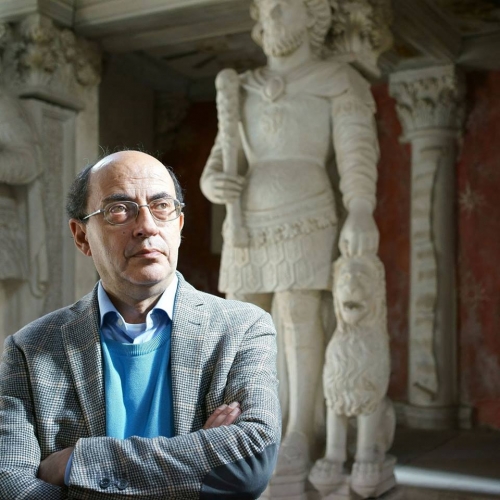
Stefano Arcella
Gentile and Evola: Friends and Enemies
by Stefano Arcella
The relations between Evola and Gentile have always been seen from the perspective of conflict, from the perspective of profound differences between the respective philosophical orientations of the two men. Evola, in his speculative period (1923–7), elaborated a conception of the absolute individual, representing a decisive overcoming of idealist philosophy in all its multiple formulations—notably those of Croce’s idealism and Gentile’s actualism. Evola, in reaching the end of his speculations, already approached the threshold of tradition, understood and perceived as openness to transcendence, and towards esotericism (as an experimental method for the knowledge and realisation of the self). His speculative period had thus been a necessary step on his path towards Tradition.
For all that, in the history of the relations between these two thinkers, there is an element that has remained utterly unknown before now: if we make ourselves aware of it, we acquire a clearer, more direct and more complete vision of the bond that united these two men—enemies to all appearances. This element is the correspondence between Evola and Gentile, which we can now consule, thanks to the courtesy the Fondazione Gentile has shown. This correspondence dates to the years 1927–9, to the time during which Evola directed the revue Ur, a publication aimed at working out a science of the Self, and which was subsequently titled a “revue of esoteric science.”
It was at this time that Gentile, with his collaborators, prepared a work of great scientific importance: the Enciclopedia Italiana, of which he was the first director. The first volume of this gargantuan work, commissioned by the Mussolinian regime, was produced in 1929. The following tomes appeared quarterly.
The most significant letter, at least from an historico-cultural perspective, is that sent by Evola to Gentile on 2 May 1928 (the year in which Imperialismo pagano was published). This letter is on paper with the letterhead of the revue Ur; it thanks Gentile heartily for having acted upon his wish to collaborate on the Enciclopedia Italiana; and Evola, in what follows, makes reference to his friend Ugo Spirito regarding the areas that might fall within his expertise.
This collaboration is confirmed in a letter of 17 May 1929, in which Evola reminds Gentile that the latter entrusted the writing of certain entries to Ugo Spirito, who in turn entrusted them to him. In this letter, Evola doesn’t specify precisely which entries are concerned, which makes our researches more difficult. Currently, we have identified with only one entry with certitude, relating to the term “Atanor,” signed with the initials “G.E.” (Giulio Evola).
These points can be verified in the volume Enciclopedia Italiana: Come e da chi è stata fatta, published under the auspices of the Istituto dell’Enciclopedia Italiana in Milan in 1947. Evola is mentioned in the list of collaborators (Evola, Giulio, p. 182); and also mentioned are the initials which he used to sign the entries of his expertise (G. Ev.), as well as the specialism in which his expertise was incorporated: “occultism.” This term designates the specialisation of the Traditionalist thinker, and not an entry in the Encyclopaedia. Furthermore, the citations, which this little introductory volume indicates beside the matter treated, suggest the volume on which Evola collaborated especially: it was vol. V, published in 1930, whose first entry was “Assi,” and last “Balso.”
Currently, we seek to identify precisely the notes prepared by Evola himself for this volume. We account for the fact that a good number of entries weren’t signed, and that the preparatory material for the Encyclopaedia must constantly be recategorised and put in order under the auspices of the Archivio Storico dell’Enciclopedia Italiana, because these masses of documents were dispersed in the course of the Second World War. Indeed, one part of the documentation had been transferred to Bergamo under the Social Republic.
Another element lets us verify Evola’s participation in this work of broad scope: Ugo Spirito mentions the name Evola in a text of 1947 among the writers of the Encyclopaedia in the domains of philosophy, economy and law. Identical indications are found in vol. V of 1930.
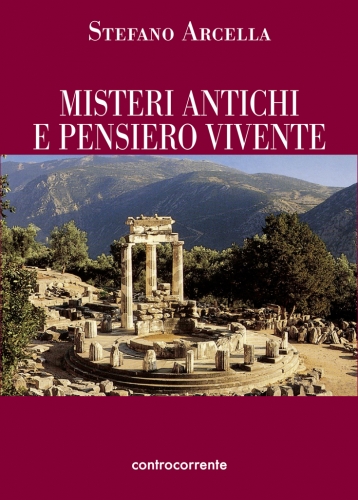
On the basis of his data, further considerations are in order. The fact that Evola wrote to Gentile on paper with the Ur letterhead, on 2 May 1928, is not random.
Evola was not a man who acted at random, above all when he might be put in contact with a philosopher of Gentile’s standing, a figure of the first rank in the Italian cultural landscape of the era. Evola then didn’t present himself to the theoretician of actualism in a personal capacity, but as the representative of a cultural thread which found its expression in Ur, the revue of which he was the director. Evola hereby attempted to formalise esoteric studies and sciences within the bounds of the dominant culture, at the historical moment at which Mussolinian Fascism triumphed. This purpose is divined immediately when one knows that the discipline attributed especially to Evola in the Encyclopaedia was “occultism.”
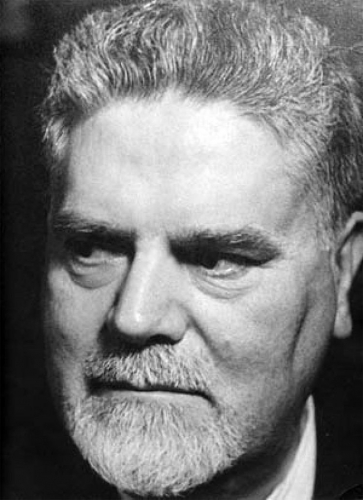
Giovanni Gentile
Gentile then accepts Evola’s collaboration, which represents, in fact, an avowed recognition of the qualifications of the theoretician of the absolute individual, as well as an indication of the attention given by Gentile to the themes treated in Ur, beyond the convictions that oppose one man to the other, and the irreducible differences of a philosophical order that separate them. Evola’s collaboration on the Encyclopaedia directed by Gentile proves that the latter counted him among the first rank of scientific minds, the cultural prestige of which was incontestable in the Italy of that epoch. From these epistolary exchanges between Evola and Gentile, we can deduce, today, a lesson which the two philosophers bequeath us in concert: they both show themselves capable of harmoniously integrating coherences to which they are strangers—coherences which contradict their own principles—which attests to an openness of spirit and a propensity for dialogue; to fertile confrontation and to collaboration, even and above all with those who express a marked otherness in character and ideas. Coherence is a positive force: it is not the rigidity of him who shuts himself up in sterile isolation. A fair play upon which it suits to meditate at this moment, at which some shout their heads off for a new inquisition.
For fifty years, we have witnessed an uncritical, misguided and unfounded demonization of our two thinkers; we’ve observed a gulf of incomprehension, of barriers which, happily, we might begin to break today, in view of the processes of transformation at work in the world of culture. All the same, the degradation of cultural debate in the aftermath of anti-fascism or party spirit is an unhappy reality of our era. To reverse the trend, it suits to return the spotlight on these bonds between Evola and Gentile—between two philosophers belonging to entirely different and opposite schools—in order to launch a debate at the Italian national level; to re-examine the roots of our recent history; to recuperate what has been unjustly stifled since 1945 and scrubbed from our consciousness in a burning fever of damnatio memoriae.
In conclusion, besides the path that the consultation of the Laterza archives offers us to explore the relations between Croce and Evola, we would also like to consult the letters of Croce; but alas, the Croce Archives have told us in so many words that “those letters are not consultable.” These are politics diametrically opposed to those practiced by the Fondazione Gentile, which itself permits one to consult, without difficulty, the letters of which I’ve informed you.
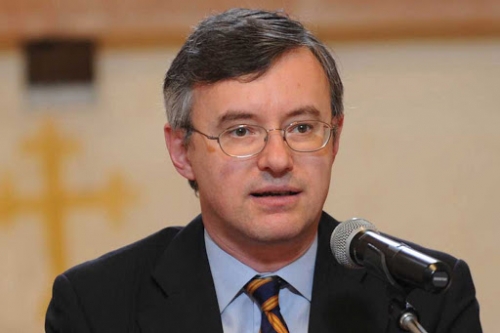
Alessandro Barbero
When Benedetto Croce “Sponsored” Evola
by Alessandro Barbero
Julius Evola and Benedetto Croce. In appearance, these two thinkers are very distant from one another. That said, for a certain period of their coexistence, they were in contact. And it wasn’t an ephemeral episode, but a link of long standing, lasting for almost a decade, from 1925 to 1933. To be more precise, we should say that Croce, in this relation, played the part of “protector,” and Evola the role of “protégé.” This relation began when Evola entered the prestigious Areopagus of authors at the publisher Laterza of Bari.
In the ’30s, Evola published many works with Laterza, which have been reissued post-War. Now, today, we still don’t know the details of these links within the publisher. In fact, two researchers, Daniela Coli and Marco Rossi, have already furnished us in the past with intelligence on the triangular relation between Evola, Croce and the publisher Laterza. Daniela Coli approached the question in a work published ten years ago with Il Mulino (Croce, Laterza e la cultura europea, 1983). Marco Rossi, for his part, raised the question in a series of articles dedicated to the cultural itinerary of Julius Evola in the ’30s, and published in Renzo de Felice’s review Storia contemporanea (6, December 1991). In his autobiography, The Cinnabar Path (Scheiwiller, 1963), Evola evokes the relations he maintained with Croce, but tells us very little, ultimately: far less, in any case, than we can divine today. Evola wrote that Croce, in a letter, did him the honour of appraising one of his books: “Well ordered, and underpinned by reasoning quite exact.” And Evola adds that he knew Croce well, personally. The inquest leads us straight to the archives of the publishers at Bari, currently deposited at the State archives of that town, which might consent to furnish us with far more detailed indications as to the relations having united these two men.
The first of Evola’s letters that we find in Laterza’s house archives isn’t dated, but must trace to the end of June 1925. In this missive, the Traditionalist thinker replies to a preceding negative response, and pleads for the publication of his Teoria dell’individuo assoluto. He writes:
It is assuredly not a happy situation in which I find myself, I, the author, obliged to insist and to struggle for your attention on the serious character and interest of this work: I believe that the recommendation of Mr. Croce is a sufficient guarantee to prove it.
Theory of the Absolute Individual
The liberal philosopher’s interest is also confirmed in a letter addressed by Laterza to Giovanni Preziosi, send on 4 June of the same year. The publisher writes: “I have had on my desk for more than twenty hours the notes that Mr. Croce sent me concerning J. Evola’s book, Teoria dell’individuo assoluto; and he recommends its publication.” In fact, Croce visited Bari around 15 May; and it was on this occasion that he transmitted his notes to Giovanni Laterza. But the book was published by Bocca in 1927. That was the first intervention, of a long series, by the philosopher in Evola’s favour.
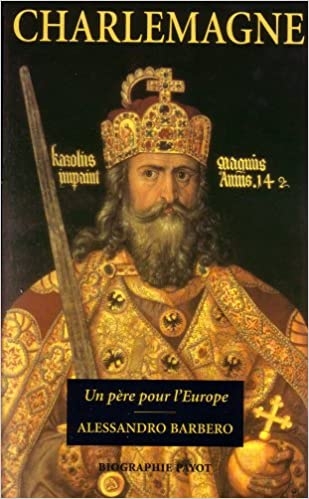
Some years later, Evola returned to knock at the door of the Bari publisher, in order to promote another of his works. In a letter sent on 23 July 1928, the Traditionalist proposed to Laterza the publication of a work on alchemical Hermeticism. On this occasion, he reminded Laterza of the Croce’s intercession on behalf of his work of a philosophical nature. This time once more, Laterza responded in the negative. Two years passed before Evola reoffered the book, having on this occasion obtained, for the second time, Croce’s support. On 13 May 1930, Evola wrote: “Senator Benedetto Croce communicated to me that you do not envisage, in principle, the possibility of publishing one of my works on the Hermetic tradition in your collection of esoteric works.” But this time, Laterza accepted Evola’s request without opposition. In the correspondence of that era between Croce and Laterza that one finds in the archives, there are no references to this book of Evola’s. This is why we may suppose that they had spoken of it in person at Croce’s house in Naples, where Giovanni Laterza has in fact stayed some days previous. In conclusion, five years after his first intervention, Croce succeeded finally in getting Evola into Laterza’s catalogue.
The third expression of interest on the part of Croce probably originated in Naples, and concerns the reedition of Cesare della Riviera’s book, Il mondo magico degli Heroi. Of the dialogues relative to this reedition, we find a first letter of 20 January 1932, in which Laterza complains to Evola of having failed to find notes on this book. A day later, Evola responds and asks that he be procured a copy of the original second edition, that he might cast an eye over it. Meanwhile, on 23 January, Croce wrote to Laterza:
I have seen in the shelves of the Biblioteca Nazionale that book of Riviera’s on magic; it’s a lovely example of what I believe to be the first edition of Mantova, 1603. It must be reissued, with dedication and preface.
The book ended up being published with a preface by Evola and his modernised transcription. A reading of the correspondence permits us to admit the following hypothesis: Croce had suggested to Laterza to entrust this work to Evola. The latter, in a letter to Laterza dated 11 February, gave his view and judged that “the thing was more boring that I’d thought it would be.”
The Anthology of Bachofen’s Writings
The fourth attempt, which was not welcomed, concerned a translation of selected writings by Bachofen. In a letter of 7 April 1933, to Laterza, Evola wrote:
With Senator Croce, we once mentioned the interest which might receive a translation of passages selected from Bachofen, a philosopher of myth much in vogue today in Germany. If this thing interests you (it might eventually join the “Modern Culture” series), I can tell you what it concerns, taking into account the opinion of Senator Croce.
In fact, Croce was preoccupied by Bachofen’s theses, as a series of articles from 1923 demonstrates. On 12 April, Laterza consults the philosopher: “Evola wrote me that you had spoken of a volume that would compile passages selected from Bachofen. Is it a project that we ought to take into consideration?” In Croce’s response, dated the following day, there is no reference to this project; but we ought to account for one fact: the letter has not been conserved in its original form.
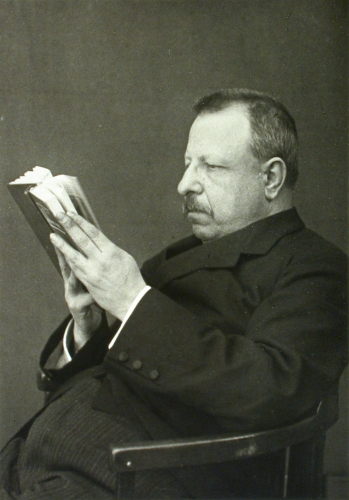
Benedetto Croce
Evola, in any case, had not rejected the idea of producing this anthology of Bachofen’s writings. In a letter of 2 May, he announces that he proposes “to write to Senator Croce, that he might remind him of to what he had alluded” in a conversation between the two. In a second letter, dated to 23, Evola asked of Laterza if he in turn had asked the opinion of Croce, while confirming that he’d written to the philosopher. Two days later, Laterza declares not “to have asked Croce for his opinion” regarding the translation, because, he adds, “he fears lest he approve of it.” This is clearly a deceit. In fact, Laterza had asked the opinion of Croce; but we still don’t know what this opinion was, nor what had been decided. The anthology of selected writings of Bachofen was finally produced, many years later, in 1949, by Bocca. From 1933, the links between Evola and Croce seem to come to an end, at least from what the Laterza house archives permit us to include.
To find the trace of a reconciliation, we must refer ourselves to the post-War period, when Croce and Evola almost met once more in the world of publishing, but without the Traditionalist thinker noticing. In 1948, on 10 December, Evola proposed to Franco Laterza, who had just succeeded his father, to publish a translation of a book by Robert Reininger, Nietzsche e il senso de la vita. After having received the text, on 17 February, Laterza wrote to Alda Croce, the daughter of the philosopher: “I enclose to you a manuscript on Nietzsche, translated by Evola. It seems to me a good work; might you see if we can include it in the ‘Library of Modern Culture’?” On 27 of the same month, the philosopher responds. Croce considers that the operation might be possible; but he provides a few reservations all the same. He postpones his decision till Alda’s return, who was a few days in Palermo. The final decision was taken in Naples, around the 23 March 1949, in the presence of Franco Laterza. The opinion of Croce is negative, seemingly under the influence of his daughter Alda. On 1 April, Laterza confirms to Evola that “the book was much appreciated [without specifying by whom] on account of its quality,” but that, for reasons of “expediency,” it had been decided not to publish it. The translation appeared much later, in 1971, with Volpe.
This refusal to publish puzzled Evola, who didn’t know the real whys and wherefores. A year later, in some letters, returning the issue to the table, Evola raised the hypothesis of a “purge.” This insinuation irritated Laterza. Following this controversy, relations between the writer and the publisher cooled. In the final analysis, we can conclude that Evola was introduced to Laterza thanks to Croce’s interest in him. He left on account of a negative opinion offered by Alda, Croce’s daughter, on one of his proposals.
00:51 Publié dans Philosophie, Révolution conservatrice, Traditions | Lien permanent | Commentaires (0) | Tags : tradition, traditionalisme, traditionalisme révolutionnaire, julius evola, benedetto croce, giovanni gentile, philosophie, philosophie italienne, italie |  |
|  del.icio.us |
del.icio.us |  |
|  Digg |
Digg | ![]() Facebook
Facebook


